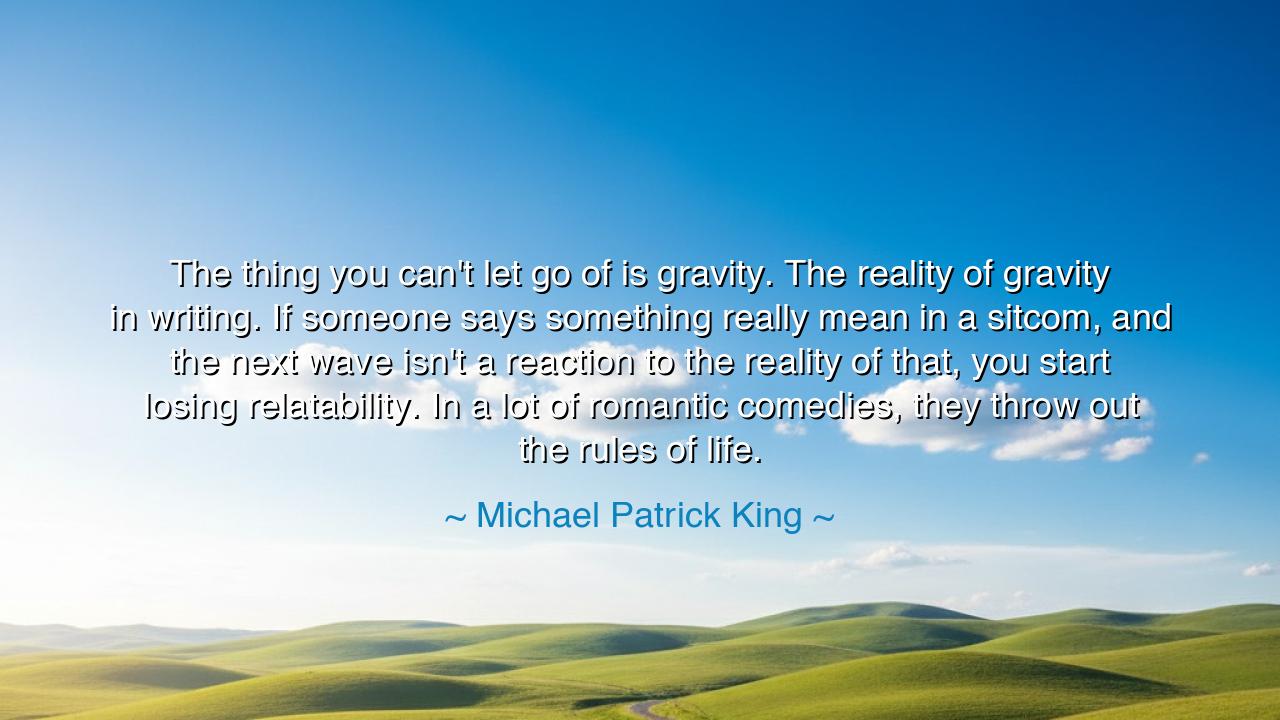
The thing you can't let go of is gravity. The reality of gravity
The thing you can't let go of is gravity. The reality of gravity in writing. If someone says something really mean in a sitcom, and the next wave isn't a reaction to the reality of that, you start losing relatability. In a lot of romantic comedies, they throw out the rules of life.






In the words of Michael Patrick King, "The thing you can't let go of is gravity. The reality of gravity in writing. If someone says something really mean in a sitcom, and the next wave isn't a reaction to the reality of that, you start losing relatability. In a lot of romantic comedies, they throw out the rules of life," we are invited to ponder the fundamental nature of storytelling—its ability to reflect the truths of human existence. King’s assertion that gravity, in the form of real consequences and emotional reactions, must remain in place is a call to honor the authenticity of the human condition. Just as the physical world adheres to the laws of gravity, so too must storytelling respect the gravity of emotions and actions, lest it lose its grounding and become disconnected from the real experiences of life.
The ancients understood the importance of gravity in storytelling. In Greek tragedies, characters are often driven by powerful forces beyond their control—fate, the will of the gods, or personal flaws that lead to inevitable downfalls. Consider Sophocles' Oedipus Rex, where the protagonist’s tragic fate is bound by the gravity of his actions and the harsh truth of his identity. No matter how much he tries to escape it, Oedipus’s actions are grounded in the reality of the consequences of his choices. This adherence to truth and real consequence gives the story its emotional weight and teaches the audience that actions have consequences, just as words spoken in anger or hurt in a modern sitcom must be met with real reactions.
Likewise, in the Roman world, playwrights such as Seneca crafted works that were steeped in moral lessons drawn from human nature and the laws of fate. In Seneca’s tragedies, characters often face the inevitability of their destinies, despite their desires or efforts to escape. Just as Oedipus cannot outrun his fate, so too must the emotional gravity of every action be respected in storytelling. If the reality of human nature and moral law were ignored, the story would lose its resonance, and the audience would be left without the lesson that every choice and word carries weight.
In Shakespeare’s works, we find similar explorations of the gravity of words and actions. In Romeo and Juliet, the misunderstandings and violence between the two families set into motion a series of tragic events, each building upon the last, until the final tragic resolution. The gravity of their actions—Romeo’s killing of Tybalt, Juliet’s feigned death, the lovers’ desperate final moments—are inextricably linked, each one carrying the weight of the previous. This interconnectedness of events is what gives Shakespeare’s tragedy its power and truth. If the characters had acted without regard to the consequences of their words and actions, the emotional impact would have been lost, and the audience would have felt the loss of relatability that King warns against.
The romantic comedy, as King points out, often defies the gravity of real life. In these films, characters are often allowed to transcend the natural consequences of their actions—mean words are forgotten quickly, miscommunications are easily swept under the rug, and life proceeds with little regard for the emotional baggage that would normally follow such situations. Consider the example of The Proposal, where the main characters, after an engagement based on a lie, suddenly realize their true feelings and live happily ever after. The gravity of their deception, the potential fallout from such a charade, is largely ignored in favor of a quick emotional resolution. The film bypasses the real consequences of such actions, choosing instead to offer a feel-good, idealized ending.
However, it is this very idealization that often makes romantic comedies feel distant from real life. When a film does not respect the gravity of human emotions, the love story can seem shallow, the relationships superficial. In contrast, when stories honor the emotional weight of characters' actions and words, the connection between the audience and the narrative becomes more profound. This is why films or stories that embrace the reality of human emotions, as King suggests, tend to resonate more deeply. They acknowledge that relationships, whether romantic or otherwise, are fraught with conflict, misunderstanding, and growth, and that real love requires the characters to reckon with these complexities.
The lesson King offers us is one of authenticity and truth in storytelling. Just as gravity in the physical world demands respect, so too must the gravity of human relationships and emotions be honored in our narratives. Whether in a romantic comedy or a tragic drama, the emotional realities of life must be acknowledged if the story is to resonate. In your own life, remember that actions and words have weight, and that the consequences of your decisions should never be ignored. Just as the best stories are those that remain grounded in truth, so should your own life be one that faces the gravity of your choices with courage, understanding, and respect. Recognize that in the real world, as in the best stories, love, friendship, and personal growth come not from idealized notions, but from the difficult yet transformative process of engaging with life’s truths and embracing the full weight of human connection.






AAdministratorAdministrator
Welcome, honored guests. Please leave a comment, we will respond soon